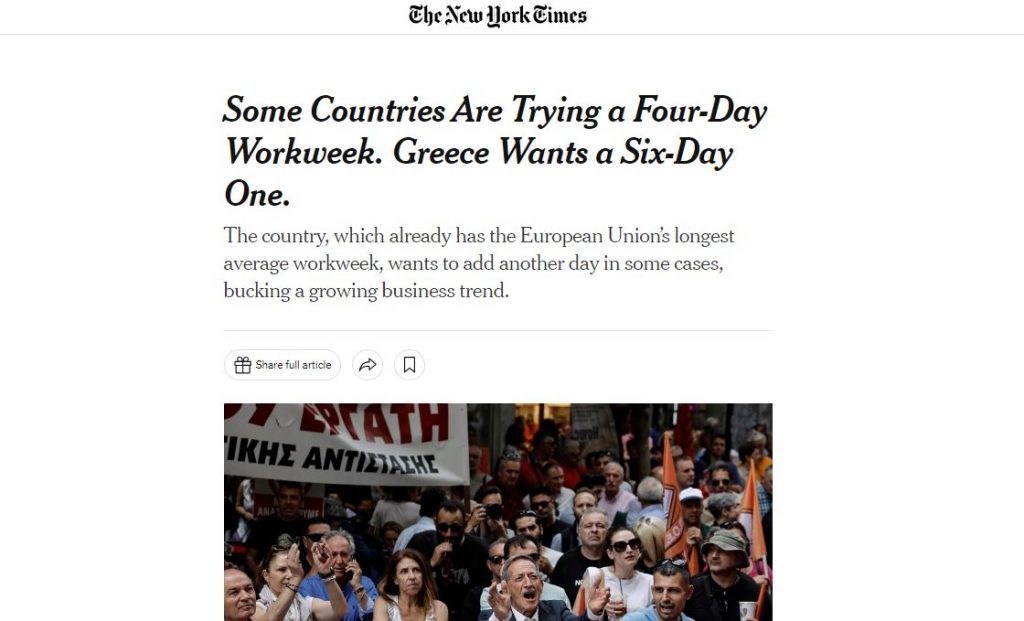A flurry of publications in the international press about the adoption of the measure in 24-hour businesses and a “baptism” with Labor Minister Niki Geramios have enthusiastically defended the Mitsotakis government’s implementation of the decision. The six-day work came into effect on July 1, while the four-day work was implemented as a pilot, without reducing the employee’s salary, in many European countries.
This measure concerns the right of an employer to unilaterally impose a six-day work week. Additional working day regime – according to Law 5053/23 – Businesses that use a five-day working week continue to operate. It is not about the public sector and banks, while tourism and catering are excluded from the regulation.
It is about going concern institutions and does not “touch” the public sector and banks. Tourism and catering are excluded from the regulation.
The workers will be paid 40% of their daily wages for the sixth day and 115% if it is a holiday, while they will be given an additional holiday in the coming week.
New York Times: Rest of World Returns to Four-Day Work, Greece Wants Six Days
A flurry of publications in the international press since the day the law came into effect has put the Greek government “at the center”. The New York Times’ response refers to the climate. In the pages of a US newspaper report that shows how wrong the government’s choice of timing is, Greece is adopting a six-day work while the rest of the world returns to four-day work.


The NYT reported that the law went into effect on July 1 and “allows certain companies to impose six-day work in an effort to support the nation’s aging workforce (…) while respecting workers’ rights.”
He underlines that the trade unions on the other hand opposed the move, “they have been pushing for better working conditions and rights for a long time and they opposed the move”.
They point to Greek uniqueness in terms of working hours, underlining that “Greece already has the longest average working week in the EU”, but prefers to add another day in some cases, “against the strengthening market trend”.
Greek productivity is 30% lower
In a detailed New York Times report, the move clearly moves in the opposite direction of the period’s data, raising the question of whether it will have an effect. It is characteristically noted that “it is unclear whether the extension of the workweek increases productivity.”
It cites data for our country, which last year had the longest average working week in the EU. “Workers spent an average of 39.8 hours on the job, compared to an average of 36.1 hours,” he notes, “quoting four-day advocates who like to point out that fewer hours, at times, can provide more productivity,” .
And Greece’s productivity has long been below the EU average. According to Eurostat data, Greece’s productivity per working hour last year was 30% below the group average.
A barrage of publications in foreign journals
Handelsblatt, the Guardian, the BBC, the Washington Post and CNBC took on the inspirational act of recall.
“The new law (…) goes against a global trend for businesses to try shorter work weeks,” notes CNBC.


The British newspaper The Guardian also devoted an in-depth report to the six-day work.
As the report says, “Companies in countries around the world may be toying with the idea of implementing shorter work weeks, but in Greece workers are now told they can work a sixth day, an unusual step aimed at improving productivity”.
The BBC notes that the six-day work was introduced in Greece “in a bid to boost economic growth”, among other things, and that the Greek government’s move is at odds with work culture in Europe and the US, where four-day working systems are becoming increasingly common.
The Washington Post writes that the new law reverses the trend of reducing the work week to four days.
“Extraordinary Working Day”
A barrage of publications inside and outside the borders put Labor Minister Niki Geramios on the defensive, who characterized the six-day counter as fake news to strong reactions from unions, the opposition and international mass media.
Nikki Geramios notes that the five-day work rule will not change, with the possibility of one day of extraordinary work being granted exceptionally in very specific cases. In fact, he reminded that the possibility of established four-day work is in practice, as well as other flexible – for employees – forms of work.
“What does six days mean? 6 days instead of 5 days for each employee. This is not the case,” said the Labor Minister (ERT1).


“Daily rest and mandatory weekly rest and the total number of hours the employee can work in a reference period of four months are also provided. So, all the safeguards are there,” he pointed out and added that in most European countries “there is the possibility of an extraordinary working day. So, Greece is different here. Nothing is done, and what’s more, if you like, it’s already been adapted to a more flexible form.”
Even Deputy Minister of Labor Kostas Karakounis has “no 6th day” but “an undeclared and hidden work strike”. In fact, speaking on Parapolitics Radio, when a government official was asked if anyone has the right to refuse a 6-day job, he replied, “He can say so, but he can’t in the context of the user’s morals. Continue to refuse work (…)”.